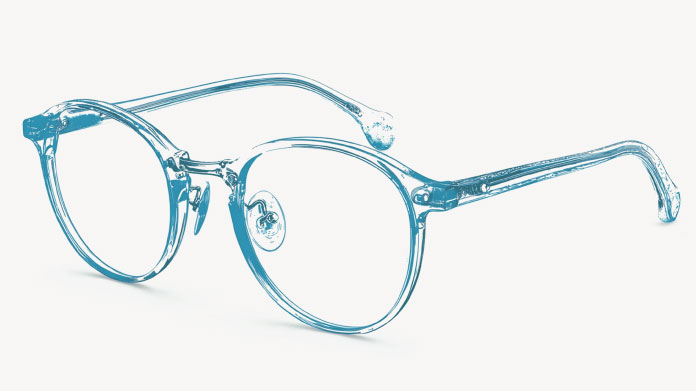What’s the best dietary supplement for your eyes?
Do you know which dietary supplement is most effective at supporting healthy vision? This article will give you a clearer view ...`

Recap: daily care of your eyes
28,000 blinks a day, 6 eye movement muscles, perception of 2 million colors: our eyes accomplish extraordinary feats to enable us to view our environment in detail. So they deserve our full attention!
To protect these precious windows on the world, try to adopt these helpful tips on a daily basis:
- carry out any visual activities (reading, writing, sewing …) in a well-lit space to prevent ocular fatigue (1);
- take regular breaks if you work in front of a screen by following the 20-7-20 rule: every 20 minutes, concentrate on an object that’s 7 meters away from you for 20 seconds (2);
- get enough rest, with at least 7-8 hours of sleep a night (3);
- for those who wear make-up, cleanse your eyes properly every night to prevent irritation;
- when outdoors, wear sunglasses suitable for the ambient light: category 4 sunglasses offer maximum protection (though they’re not permitted for driving);
- wear the glasses or lenses prescribed for you for optimal visual comfort;
- even if you have no problems with your eyesight, have an eye test every two or three years in order to detect any silent diseases at the earliest stage (AMD, cataracts, glaucoma…)
The best substances for maintaining healthy vision
Vitamin A and the retina
A fat-soluble vitamin, vitamin A plays a crucial role in many biological functions. Amongst others, it is involved in metabolising iron, and in maintaining normal immune function and healthy skin (4-6).
However, it was in the retina that vitamin A was first isolated! As you know, the retina is the innermost membrane lining the eyeball. It is responsible for converting light signals into electrical impulses transmitted to the central nervous system which then translates them into images. To do this, the retina is equipped with two types of photoreceptor: rods and cones. The rods, which work in low light, ensure monochrome vision in darkness. The cones are responsible for our perception of color when light levels are higher.
Vitamin A helps to maintain normal vision by participating in the production of rhodopsin (visual purple) (7). This reddish-purple pigment absorbs light in the retina’s rods, and is thus much in demand when the eyes need to adapt to darkness. Vitamin A also plays a role in maintaining ‘mucous membranes’, including the conjunctiva covering the delicate cornea (8).
The body cannot produce vitamin A and it therefore needs to be provided by the diet, in two main ways: either through direct intake of preformed vitamin A from animal-source products (retinol), or through consumption of plant-source foods rich in carotenoids (beta-carotene).
Bilberries, ‘berry’ good for the eyes
The realisation that bilberries (Vaccinium myrtillus) offered benefits for the ‘windows to the soul’ dates back a long way. As far back as the Middle Ages, the visionary healer Hildegarde de Bingen had already identified them as an invaluable aid for failing eyesight. Much later, this blue-black berry became very popular with British fighter pilots in the Second World War for helping to maintain their visual acuity on night flights.
Since then, this member of the Ericaceae family has continued to interest scientists, in particular, for its high content of anthocyanins, the pigments that give the bilberry its dark color. It appears that bilberries help to maintain eye health and visual function through antioxidant action and venous support (9-11).
Amongst others, they play a role in stabilising the formation of collagen in the eyes, a key substance for the cohesion and protection of eye tissue. In addition, they support the health of veins and capillaries which supply the optical nerve and corneal limbus, ensuring an adequate supply of oxygen and nutrients.
What is the best supplement for the eyes?
As you can see, a supplement that’s good for the eyes needs to feature retinol and bilberry in its composition.
The perfect synergistic formulation would also include carotenoids (astaxanthin, zeaxanthin, lutein) and other promising compounds (such as anthocyanosides, anthocyanins, polyphenols or quercetin) (12).
Which is precisely the case with the supplement OptiVision which contains a total of 15 exceptional compounds, with the emphasis on natural ingredients: retinol and bilberry extract of course, but also carotenoids, glutathione, extract of grape seed, marigold, Schisandra berries ...
Additional supplements for tip-top vision
There are other substances that can also help you take care of your eyes.
Highly present in the retina, DHA helps to maintain healthy vision (13-14). It’s therefore well worth considering supplementing with this particular omega-3 fatty acid (try, for example, the product Super DHA, an environmentally-friendly formulation of DHA and EPA obtained from sustainable fishing).
Another of Nature’s important resources is maritime pine bark (Pinus pinaster) which helps to maintain eye health specifically by supporting vascularisation (15). To obtain its benefits, try a targeted eye health supplement (such as Eye Pressure Control, a formulation enriched with bilberry and vitamin E).
It’s always a good idea - not just for your eyes but for your overall health - to fight against the oxidation processes that speed up cellular aging, by eating a diet high in antioxidant-rich, highly-colored fruits and vegetables (16). If you want to boost your intake, try a super-comprehensive supplement (such as AntiOxidant Synergy, a really powerful formulation that includes turmeric, grape seed and resveratrol).
References
- Lin KH, Su CC, Chen YY, Chu PC. The Effects of Lighting Problems on Eye Symptoms among Cleanroom Microscope Workers. Int J Environ Res Public Health. 2019;16(1):101. Published 2019 Jan 1. doi:10.3390/ijerph16010101
- Sheppard AL, Wolffsohn JS. Digital eye strain : prevalence, measurement and amelioration. BMJ Open Ophthalmol. 2018;3(1):e000146. Published 2018 Apr 16. doi:10.1136/bmjophth-2018-000146
- Waller EA, Bendel RE, Kaplan J. Sleep disorders and the eye. Mayo Clin Proc. 2008 Nov;83(11):1251-61. doi: 10.4065/83.11.1251. PMID: 18990324.
- da Cunha MSB, Campos Hankins NA, Arruda SF. Effect of vitamin A supplementation on iron status in humans : A systematic review and meta-analysis. Crit Rev Food Sci Nutr. 2019;59(11):1767-1781. doi: 10.1080/10408398.2018.1427552. Epub 2018 Feb 5. PMID: 29336593.
- Huang Z, Liu Y, Qi G, Brand D, Zheng SG. Role of Vitamin A in the Immune System. J Clin Med. 2018;7(9):258. Published 2018 Sep 6. doi:10.3390/jcm7090258
- Kafi R, Kwak HS, Schumacher WE, Cho S, Hanft VN, Hamilton TA, King AL, Neal JD, Varani J, Fisher GJ, Voorhees JJ, Kang S. Improvement of naturally aged skin with vitamin A (retinol). Arch Dermatol. 2007 May;143(5):606-12. doi: 10.1001/archderm.143.5.606. PMID: 17515510.
- Miyazono S, Isayama T, Delori FC, Makino CL. Vitamin A activates rhodopsin and sensitizes it to ultraviolet light. Vis Neurosci. 2011;28(6):485-497. doi:10.1017/S0952523811000423
- Sadowski B, Rohrbach JM, Steuhl KP, Weidle EG, Castrillón-Oberndorfer WL. Hornhautmanifestationen bei Vitamin-A-Mangel [Corneal manifestations in Vitamin A deficiency]. Klin Monbl Augenheilkd. 1994 Aug;205(2):76-85. German. doi: 10.1055/s-2008-1045496. PMID: 7967410.
- Riva A, Togni S, Franceschi F, Kawada S, Inaba Y, Eggenhoffner R, Giacomelli L. The effect of a natural, standardized bilberry extract (Mirtoselect®) in dry eye: a randomized, double blinded, placebo-controlled trial. Eur Rev Med Pharmacol Sci. 2017 May;21(10):2518-2525. PMID: 28617532.
- Ozawa Y, Kawashima M, Inoue S, Inagaki E, Suzuki A, Ooe E, Kobayashi S, Tsubota K. Bilberry extract supplementation for preventing eye fatigue in video display terminal workers. J Nutr Health Aging. 2015 May;19(5):548-54. doi: 10.1007/s12603-014-0573-6. PMID: 25923485.
- Nomi Y, Iwasaki-Kurashige K, Matsumoto H. Therapeutic Effects of Anthocyanins for Vision and Eye Health. Molecules. 2019;24(18):3311. Published 2019 Sep 11. doi:10.3390/molecules24183311
- Johra FT, Bepari AK, Bristy AT, Reza HM. A Mechanistic Review of β-Carotene, Lutein, and Zeaxanthin in Eye Health and Disease. Antioxidants (Basel). 2020;9(11):1046. Published 2020 Oct 26. doi:10.3390/antiox9111046
- Cortina MS, Bazan HE. Docosahexaenoic acid, protectins and dry eye. Curr Opin Clin Nutr Metab Care. 2011;14(2):132-137. doi:10.1097/MCO.0b013e328342bb1a
- Querques G, Forte R, Souied EH. Retina and omega-3. J Nutr Metab. 2011;2011:748361. doi:10.1155/2011/748361
- Schönlau F, Rohdewald P. Pycnogenol for diabetic retinopathy. A review. Int Ophthalmol. 2001;24(3):161-71. doi: 10.1023/a:1 021 160 924 583. PMID: 12498513.
- Chiu CJ, Taylor A. Nutritional antioxidants and age-related cataract and maculopathy. Exp Eye Res. 2007 Feb;84(2):229-45. doi: 10.1016/j.exer.2006.05.015. Epub 2006 Jul 31. PMID: 16879819.
Keywords
5 Days
great products and prices
great products and prices
Marie
11 Days
Easy to navigate site
Easy to navigate site, had what I was searching for, good price. easy order-check out
James Tucker
17 Days
My skin is clearing up nicely!
Pretty good for my skin so far.
Christian
19 Days
The new packaging is excellent
The new packaging is excellent - finally! No more squashed boxes and torn envelopes.
GORAN
20 Days
Great Product
Great Product
Larry Garrett
24 Days
Quick shipping
Quick shipping; good price. No issues!
Mary McCarty
26 Days
Thr product is very good and is helping…
Thr product is very good and is helping me on my health. Then is always on time
LUGO Luz
28 Days
Buying was fine
Buying was fine. I had problems with the website not recognizing my login info, and had to call to get it fixed. Other than that, everything was good.
David S. Clark
29 Days
Your super maca and super ginseng are…phenomenal
Your super maca and super ginseng are phenomenal supplements that compliment each other when taking them together. Fantastic feeling of well-being and lots of mid day energy without the crash.
Keith Mason
31 Days
I have had amazing results with every…
I have had amazing results with every supplement I've purchased. I am extremely satisfied with this company
kirstin Torres
31 Days
Fine products
Fine products . They are on the leading edge of online supplements. The only issue -so far-is they sometime run out of subscription items.
Jason Argos
34 Days
The ordering process is very user…
The ordering process is very user friendly and the products always come in a timely manner.
CARTER Rhonda
35 Days
The price for Dr
The price for Dr. Pero's AC-11 is reasonable and in line with his views. (my former colleague). Keep it pure.
CAMPBELL Clayton
38 Days
Right on every time.
Right on every time.
Arthur Nicholas
41 Days
They are cheaper than everyone else and…
They are cheaper than everyone else and the shipping was fast. Great company.
Patricia Adams




